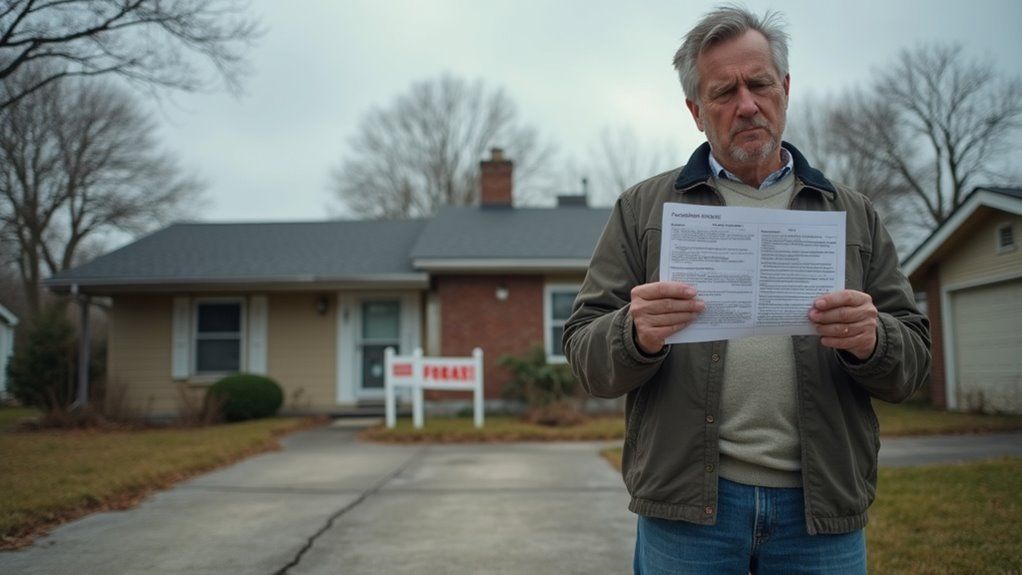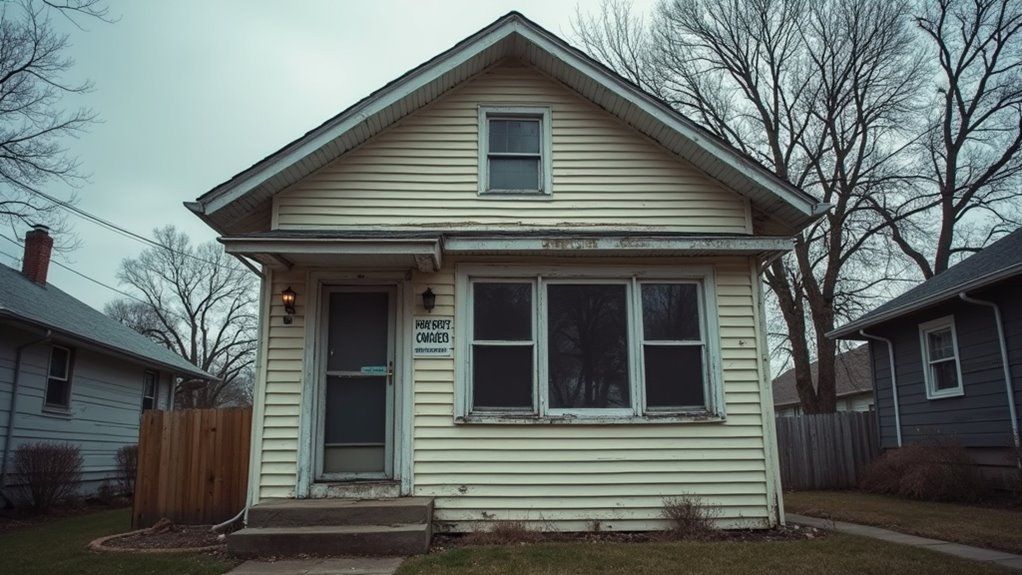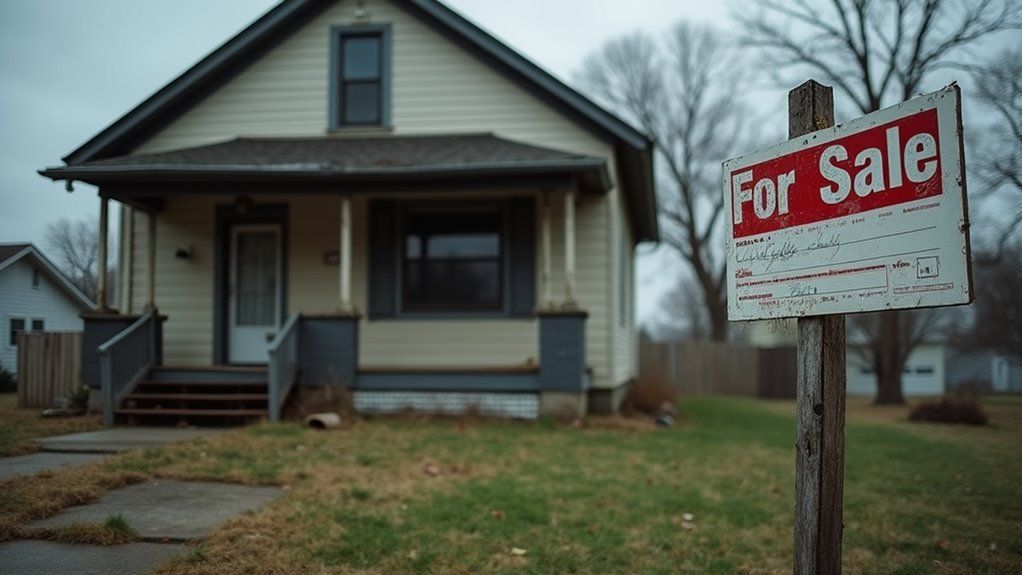Can I Sell My House While in Foreclosure?

Facing foreclosure feels like drowning while watching your home slip away through your fingers. The clock ticks mercilessly as your credit score hangs in the balance and financial options narrow. Every day that passes brings you closer to losing your home entirely. Yet there’s a lifeline most homeowners don’t know about - selling your property strategically can stop the foreclosure train in its tracks.
Yes, you can legally sell your home during the foreclosure process, often using the proceeds to pay off your mortgage debt. This approach can protect your credit score from the severe damage a completed foreclosure would cause. You must act quickly though, working directly with your lender before the bank takes full possession.
In this blog I will explore everything about selling your house during foreclosure and saving your financial future.
Key Takeaways
- Yes, homeowners can sell their house during foreclosure until the court confirms the sale.
- Disclosure of foreclosure status is required when selling in Oklahoma to avoid legal issues.
- Selling to cash buyers can be quick, often closing within 7-14 days, helping to avoid foreclosure.
- Homeowners must obtain lender approval and proper documentation, like payoff statements, before selling.
- Alternatives like short sales or deed in lieu of foreclosure can help resolve the situation while selling.
What is Foreclosure and How Does It Affect Homeowners?

Foreclosure happens when homeowners can’t make mortgage payments. It allows lenders to take ownership of the home. Homeowners lose property rights during this legal process. The original mortgage debt remains until the property sells.
This situation creates stress and uncertainty for families. Credit scores typically drop significantly after foreclosure. Future housing options become limited due to damaged credit history.
Homeowners should explore alternatives like loan modification or forbearance. Banks sometimes offer short sales as another option. Moreover, some states provide protection programs for struggling homeowners.
Can You Legally Sell Your House During Foreclosure?

You can sell your house during foreclosure in Oklahoma before the court confirms the sale, but it’s not automatic—you need to follow specific laws and notify buyers of your foreclosure status.
Lenders require approval for short sales or payoff agreements, and all liens and taxes must be settled at closing.
Make sure to disclose your foreclosure situation to avoid legal issues and ensure a smooth transaction.
Legal Rights of Homeowners in Foreclosure
Oklahoma homeowners can legally sell their property until the court confirms the foreclosure sale.
This right remains intact throughout the foreclosure process under state law. You maintain control over your property during this period. Your options include short sales or cash offers from investors.
These alternatives may help avoid a completed foreclosure on your credit report. Many homeowners find relief through these paths. Furthermore, selling before completion can sometimes preserve equity.
The law provides this protection specifically to give homeowners a final opportunity to resolve their situation. Act quickly to explore all available options. Remember that timing matters significantly in these situations.
State-Specific Foreclosure Laws
Each state has different foreclosure laws that affect homeowner rights. Oklahoma law permits homeowners to sell their property during the pre-foreclosure period before court finalization.
Homeowners must act quickly when facing foreclosure threats. You must respond to all foreclosure notices within the timeframes specified by Oklahoma statutes. Open communication with your lender can create selling opportunities during pre-foreclosure.
Furthermore, legal compliance protects your interests throughout the process. Time remains your most valuable asset in foreclosure situations. Quick action preserves more options and potentially better financial outcomes.
Disclosure Requirements When Selling
You must disclose foreclosure status when selling a home in Oklahoma. State law requires transparency about the property’s foreclosure condition and any title problems. This legal obligation protects all parties involved in the transaction.
Legal consequences await sellers who hide these crucial details. Your sale could face delays or cancellation without proper disclosure.
Buyers might pursue damages if they discover undisclosed foreclosure issues after purchase. Moreover, honest communication builds trust with potential buyers.
Transparency often leads to smoother transactions despite challenging circumstances. In this situation, doing the right thing also serves your best interests.
What Are Your Options When Facing Foreclosure?

When facing foreclosure, you have several options to consider, like negotiating a loan modification or forbearance to keep your home.
You could also pursue a short sale or deed in lieu of foreclosure to avoid losing your property entirely, or even file for bankruptcy to pause the process temporarily.
Exploring cash buyers offers a quick, no-fuss way to sell your house and possibly settle your debts.
Loan Modification and Forbearance
Loan modifications and forbearance plans can prevent foreclosure by adjusting your mortgage terms. Call your lender immediately to discuss these options. HUD-approved housing counselors offer free guidance through this complex process.
Time matters when facing potential foreclosure. Request temporary payment reductions if you’re experiencing financial hardship.
Most lenders prefer workout solutions rather than costly foreclosure proceedings.
Your credit score benefits when you proactively address mortgage problems. Submit all required financial documentation promptly. Many homeowners successfully avoid foreclosure through these programs each year.
Short Sale Possibilities
Yes, you can sell your home for less than you owe with bank approval. A short sale helps homeowners avoid foreclosure when they owe more than their property’s value. This option causes less damage to your credit score than a foreclosure.
Lender approval is required before you can proceed with any short sale transaction. The bank must agree to accept less than the full mortgage balance.
Time matters in this situation. Contact your lender immediately if you’re falling behind on payments. Many lenders prefer short sales to foreclosure because they typically lose less money. Furthermore, you might qualify for relocation assistance after completing the process.
Deed in Lieu of Foreclosure
A deed in lieu of foreclosure lets you transfer property ownership to your lender voluntarily instead of facing foreclosure. This option ends your mortgage obligation quickly and avoids the public auction process.
You must meet specific requirements to qualify, including lender approval.
The benefits include potential protection from deficiency judgments and less damage to your credit score. Additionally, this approach simplifies the transition away from unaffordable property.
Before proceeding, consult with a housing counselor. The lender must agree to this arrangement, as it’s not an automatic right for borrowers.
Bankruptcy Considerations
Bankruptcy can temporarily stop a foreclosure and create time for homeowners to explore options.
Chapter 13 bankruptcy allows you to reorganize debts while staying in your home. This legal protection activates an automatic stay that prevents creditors from continuing collection efforts.
During this period, you can develop a repayment plan or pursue alternatives like loan modifications.
The court-supervised process provides breathing room to stabilize your finances. Furthermore, bankruptcy may eliminate certain debts and reduce financial pressure while you address your mortgage situation.
Selling to Cash Buyers
Cash buyers offer a quick solution for homeowners facing foreclosure. They purchase properties fast, often closing within days instead of months. You can sell your house as-is without making costly repairs or improvements.
The process involves minimal paperwork compared to traditional sales. This simplicity helps prevent delays when time is critical.
Cash buyers typically require proof of clear title and settlement of any liens before completing the purchase.
Furthermore, selling to cash buyers provides immediate financial relief.
This option creates a path toward stability and a fresh start during difficult circumstances.
Many homeowners appreciate the straightforward nature of these transactions.
How to Sell Your House During the Foreclosure Process?
You need to act fast—selling your house before the foreclosure sale is crucial. Coordinate closely with your lender, ensuring all documents are in order and any liens are paid off. Missing deadlines or paperwork can cost you the chance to sell and leave you with even more debt.
Timing Considerations and Deadlines
Quick action is essential during foreclosure to successfully sell your home. The foreclosure process follows a strict timeline with crucial deadlines you must meet.
You must sell your house before the court confirms the sale to avoid complete loss of ownership. Contact your lenders immediately when facing foreclosure. They may offer options to delay the process.
All property liens require resolution before closing can occur. The sheriff’s auction represents your final deadline. Once this happens, you lose control of the sale.
Furthermore, staying ahead of these deadlines protects your credit score and financial future.
Working with Mortgage Lenders
You must communicate with your mortgage lender during foreclosure. Contact them immediately when facing payment difficulties. Lenders can approve short sales or other foreclosure alternatives.
You need lender permission to sell your home during foreclosure proceedings. This requirement applies especially to short sales. Lenders must agree to any payoff amount that’s less than your full debt.
Always get written confirmation of agreements with your lender. Make sure you understand how sale proceeds will be applied to your debt. The paperwork should clearly state whether you’ll face any remaining liability after the sale.
Proper Documentation Requirements
You need these key documents when selling a house in foreclosure: First, get a title report that proves you own the property. This document shows you have legal authority to sell.
Complete the Oklahoma Residential Property Condition Disclosure Statement as required by law. This form discloses the property’s condition to potential buyers.
Additionally, request mortgage payoff statements from your lender. Before closing, make sure all liens and taxes are paid. This prevents delays during the sale process.
Furthermore, proper documentation helps the transaction proceed smoothly. Time matters in foreclosure situations, so gather these documents promptly.
Clearing Outstanding Liens
You must pay all liens on your property before selling during foreclosure. This includes your mortgage balance.
Liens always take priority in a home sale. Sale proceeds will go toward these debts first. Dealing with liens quickly protects potential buyers from complications.
These actions also shield you from future legal problems. The property can then transfer smoothly to its new owner. This approach serves everyone’s interests in the transaction.
Furthermore, lien clearance creates a clean title that buyers and their lenders require.
What Happens to Mortgage Debt After Selling?
Once your house sells, you’ll need to settle any remaining mortgage balance. If the sale doesn’t cover everything, the lender might pursue a deficiency judgment against you.
Be aware that forgiven debt could also lead to tax consequences, so understanding these outcomes is critical.
Paying Off the Remaining Balance
You must settle your outstanding mortgage when selling during foreclosure. The sale proceeds go directly to your lender. If your sale covers the total debt, you’ll walk away clear of obligations.
For shortfalls, contact your lender immediately to confirm the exact remaining amount.
Some states allow lenders to pursue deficiency judgments for unpaid balances after a sale.
Additionally, unpaid mortgage debt might trigger tax consequences.
Prompt action protects your financial future. Your lender may offer payment plans or settlements for remaining balances.
Remember that addressing shortfalls quickly prevents further damage to your credit score.
Deficiency Judgments Explained
A deficiency judgment allows lenders to collect remaining mortgage debt after a home sale falls short. Your lender can legally pursue you for the difference between your sale price and loan balance.
Lenders must follow specific state laws when filing for these judgments. This process varies by location.
Consulting an attorney helps protect your rights during this challenging situation. Many states limit how much lenders can recover or set time restrictions on claims.
Quick action often prevents the worst financial outcomes. Consider negotiating with your lender for possible debt forgiveness or payment plans.
Tax Implications of Foreclosure Sales
Foreclosure sales can create unexpected tax obligations. The IRS may treat forgiven mortgage debt as taxable income. Profits from the sale may be subject to capital gains tax.
Your lender might send a 1099-C form reporting canceled debt as income. Several exceptions exist that could help your situation.
The Mortgage Forgiveness Debt Relief Act offers protection in certain cases. Primary residence foreclosures have different rules than investment properties.
Consider consulting a tax professional immediately. They can identify potential exclusions for your specific circumstances.
Many homeowners qualify for exemptions but miss them without proper guidance.
How Does a Pre-Foreclosure Sale Differ from Regular Home Sales?
Pre-foreclosure sales often require pricing your home below market value to sell quickly, so you can avoid losing it to auction.
You must disclose your foreclosure status to potential buyers, which can impact their interest and your negotiating power.
Plus, timing is tight—your sale must happen before the court confirms the foreclosure, leaving little room for delays.
Pricing Strategy for Quick Sales
Price your pre-foreclosure home 10-15% below market value to attract fast offers. This discount creates urgency and compensates buyers for potential property issues. Always disclose the foreclosure status to build trust with potential buyers.
Your pricing should remain flexible. Listen to feedback from showings and adjust accordingly. Most pre-foreclosure homes sell faster with competitive pricing rather than holding out for maximum value.
Work with a real estate agent who specializes in distressed properties to set the optimal price point. Their expertise helps balance speed and financial recovery. This professional guidance often leads to better outcomes than pricing alone.
Disclosure Requirements
You must inform buyers about your home’s pre-foreclosure status. State laws require full disclosure of any default or foreclosure proceedings when selling property. This protects all parties and prevents future legal complications.
Honesty serves both you and potential buyers throughout the transaction. When listing your property, clearly state its foreclosure status in all marketing materials.
Many buyers specifically look for pre-foreclosure homes due to potential savings.
Additionally, provide all standard property disclosures required in your state. Transparent communication builds trust and often leads to smoother negotiations despite the challenging circumstances.
Timeline Constraints
Pre-foreclosure home sales operate under strict time limits. You have only until your foreclosure auction date to complete the sale.
Homeowners typically have 30-120 days from the first missed payment before foreclosure proceedings begin. Some states allow sales during redemption periods after auctions.
Your lender must approve any short sale when you owe more than the home’s value. This approval process can take weeks or months. Delays might eliminate your selling opportunity completely.
For the best outcome, start the selling process immediately after receiving a default notice. Quick action preserves more options and potentially saves your credit score.
Why Consider Selling to Cash Home Buyers?
Selling to cash home buyers can speed up your foreclosure process, often closing within days instead of weeks.
You won’t need to spend money on repairs or renovations, making the sale easier during a stressful time.
Plus, these sales typically involve less paperwork and eliminate traditional real estate commissions, saving you money and hassle.
Speed of Transaction Benefits
Cash home buyers can complete purchases within days instead of months. This speed provides immediate relief when facing foreclosure. You receive money quickly without making repairs or renovations.
The closing process typically takes 7-14 days versus 30-60 days with traditional buyers.
Most cash buyers purchase properties “as-is” regardless of condition. The simplified process involves fewer legal hurdles and less paperwork.
As a result, you can settle your mortgage faster and stop foreclosure proceedings immediately. Furthermore, you avoid costly listing fees and commission charges.
This rapid timeline helps reduce stress during an already difficult financial situation.
No Repairs or Renovations Needed
Cash buyers purchase homes in their current condition. You won’t need to fix anything before selling your property. This saves both time and money during the foreclosure process.
The “as-is” purchase eliminates renovation expenses completely. Your home can sell quickly even with existing issues or damage. Homeowners typically save between $5,000-$15,000 by avoiding pre-sale repairs.
Additionally, you’ll bypass inspection contingencies and repair negotiations. The streamlined process helps you meet tight foreclosure deadlines.
For this reason, many distressed homeowners choose the cash-buyer route when facing time constraints.
Simplified Paperwork Process
Cash home buyers reduce foreclosure paperwork significantly. You’ll handle fewer documents and simpler legal steps when closing.
The foreclosure sale contract typically gets approved in 1-3 days instead of weeks. Most cash buyers require minimal property inspections and disclosure forms.
Court involvement decreases substantially with cash transactions. Additionally, the settlement process completes faster without lender delays.
For homeowners facing foreclosure, this streamlined approach removes administrative burdens.
The simplified paperwork protects your time and reduces stress during an already difficult situation.
Furthermore, you can focus on your next housing arrangements rather than drowning in documentation.
Avoiding Real Estate Commission Fees
You can avoid commission fees by selling to cash home buyers. This approach saves you thousands of dollars normally paid to realtors. The process works through direct sales that skip traditional agent involvement. Cash buyers typically handle paperwork and closing costs themselves.
Another benefit includes faster closing timelines compared to traditional sales. Most cash transactions complete within 1-2 weeks rather than months.
Real estate commissions typically range from 5-6% of your home’s selling price. This means $15,000-$18,000 on a $300,000 home sale.
For homeowners facing foreclosure, cash sales provide a quick exit strategy. You receive funds promptly and can settle debts immediately. Consider consulting with an attorney before proceeding.
Contact Tulsa Home Buyers Today for a Fast, Stress-Free Solution
Tulsa Home Buyers offers immediate help for homeowners facing foreclosure. We evaluate your property quickly and present fair cash offers within 24 hours.
Our team connects you with investors specializing in foreclosure purchases to maximize your options. You can avoid complicated legal processes through our streamlined approach.
Furthermore, we understand each situation is unique. Our flexible solutions work with your timeline and specific circumstances.
Take action today to protect your financial future. Visit our website to schedule a no-obligation consultation.
Frequently Asked Questions
Can I Sell My House During the Judicial Foreclosure Process in Oklahoma?
Yes, you can sell your house during the judicial foreclosure process in Oklahoma before the court confirms the sale. Act quickly, disclose your foreclosure status, and coordinate with the lender to ensure a smooth sale and satisfy your mortgage obligations.
Are There Penalties for Selling After Foreclosure Proceedings Have Started?
In Oklahoma, foreclosure rates are lower than national averages, but penalties for selling after foreclosure proceedings start include significant deficiency judgments, liens, and legal consequences. Act quickly, communicate with lenders, and ensure full disclosure to protect yourself and buyers.
How Does a Short Sale Impact My Credit Score in Oklahoma?
A short sale in Oklahoma can slightly impact your credit, but it’s often less damaging than foreclosure. Acting quickly helps protect your credit, so prioritize working with your lender and a housing counselor to investigate options and minimize harm.
What Legal Disclosures Are Required When Selling a Foreclosed Property?
Envision opening a door of honesty; you’re required to disclose foreclosure status, property issues, liens, and condition. Transparency clears the path, ensuring buyers understand the house’s story, protecting everyone, and fulfilling Oklahoma law’s vital role.
Can I Sell My House to a Family Member During Foreclosure?
Yes, you can sell your house to a family member during foreclosure, but you must disclose the foreclosure status, get lender approval if required, and ensure all legal and financial obligations are settled before completing the transfer.
Ready to work with Tulsa Home Buyers?
Let's connect! We’re here to help.
Send us a message and we’ll be in touch.
Or give us a call today at (918) 516-8951


